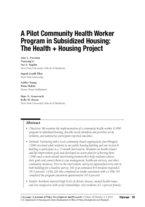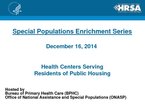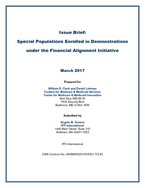0
Publication
Community:
The Home Preservation Initiative (HPI) for Healthy Living seeks to improve asthma outcomes related to unhealthy housing in five neighborhoods in West Philadelphia. By combining home repairs and community health worker home visits, HPI aims to significantly reduce emergency department visits and hospitalizations due to pediatric asthma. For these primarily African-American communities, substandard housing, unemployment, low wages and a lack of education are barriers to the overall health and well-being of residents. Using outcome data, the collaboration will show health care cost savings, aiming to make a strong case for Medicaid reimbursement for home repairs.
Authored by: The BUILD Health Challenge
Topics: Asthma, Cost effectiveness, Data sharing, East Coast, Health, Low-income, Medicaid / Medicare, Partnerships, Racial inequalities, Research
 Shared by Housing Is
Shared by Housing Is
Housing Is posted a
on Mar 19, 2019
The BUILD Health Challenge
The Home Preservation Initiative (HPI) for Healthy Living seeks to improve asthma outcomes related to unhealthy housing in five neighborhoods in West Philadelphia.
0
News Article
Community:
Jan 8, 2019
Massachusetts Attorney General Maura Healey on Tuesday announced $3 million in grants to 13 community organizations that address things like housing, hunger and other societal factors that affect someone’s health.
Authored by: Shira Schoenberg for Mass Live
Topics: East Coast, Food insecurity, Health, Housing, Low-income, Nutrition, Partnerships, Preventative care
 Shared by Housing Is
Shared by Housing Is
Housing Is posted a
on Jan 16, 2019
Shira Schoenberg for Mass Live
Massachusetts Attorney General Maura Healey on Tuesday announced $3 million in grants to 13 community organizations that address things like housing, hunger and other societal factors that affect someone’s health.
0
News Article
Community:
Jan 10, 2019
Island School is one of 247 “community schools” in New York. These are regular public schools, with a twist. They have longer days and longer school years: Island stays open 12 hours a day, six days a week, including spring and winter breaks as well as the summer. A psychologist makes weekly rounds. A dentist comes by regularly. So does an optometrist, and students who need glasses get them free.
Authored by: David L. Kirk for The New York Times
Topics: Community development, Dual-generation, East Coast, Education, Family engagement, Homelessness, Housing, Low-income, Mental health, Metrics, Partnerships, Stability, Youth
 Shared by Mica O'Brien
Shared by Mica O'Brien
Mica O'Brien posted a
on Jan 10, 2019
David L. Kirk for The New York Times
Island School is one of 247 “community schools” in New York. These are regular public schools, with a twist. They have longer days and longer school years: Island stays open 12 hours a day, six days a week, including spring and winter breaks as well as the summer.
0
Research
Community:
Oct 29, 2018
We examine the implementation of a community health worker (CHW) program in subsidized housing, describe needs identified and priorities set by residents, and summarize participant-reported outcomes.
Authored by: New York University School of Medicine, New York University, Henry Street Settlement, New York University School of Medicine
Topics: East Coast, Health, Housing, Low-income, Partnerships, Place-based, Research
 Shared by Mica O'Brien
Shared by Mica O'Brien
Mica O'Brien posted a
on Oct 29, 2018
New York University School of Medicine, New York University, Henry Street Settlement, New York University School of Medicine
We examine the implementation of a community health worker (CHW) program in subsidized housing, describe needs identified and priorities set by residents, and summarize participant-reported outcomes.
0
Report
Community:
Jul 26, 2018
Neighborhoods where insecure housing overlaps with higher rates of emergency department use may be promising areas for interventions under Medicaid value-based payment
Authored by: United Hospital Fund
Topics: East Coast, Health, Housing, Low-income, Medicaid / Medicare, Partnerships, Stability
 Shared by Mica O'Brien
Shared by Mica O'Brien
Mica O'Brien posted a
on Oct 10, 2018
Neighborhoods where insecure housing overlaps with higher rates of emergency department use may be promising areas for interventions under Medicaid value-based payment
0
Research
Community:
Aug 1, 2018
We examine the implementation of a community health worker (CHW)
program in subsidized housing, describe needs identified and priorities set by residents, and summarize participant-reported outcomes.
Authored by:
Topics: East Coast, Health, Housing, Low-income, Mental health, Metrics, Partnerships, Place-based, Racial inequalities, Research
 Shared by Housing Is
Shared by Housing Is
Housing Is posted a
on Aug 1, 2018
We examine the implementation of a community health worker (CHW)
program in subsidized housing, describe needs identified and priorities set by residents, and summarize participant-reported outcomes.
0
Publication
Community:
Jul 27, 2018
Authored by:
Topics: Asthma, East Coast, Health, Healthy homes, Housing, Low-income, Partnerships, Supportive housing
 Shared by Housing Is
Shared by Housing Is
Housing Is posted a
on Jul 27, 2018
0
Report
Community:
Jul 18, 2018
This Issue Brief provides an update on the beneficiary experience in the first two demonstrations that were implemented as part of the Centers for Medicare & Medicaid Services (CMS) Financial Alignment Initiative to test integrated care and financing models for Medicare-Medicaid enrollees. The Washington Health Homes MFFS demonstration, a managed fee-forservice model demonstration, and the Massachusetts One Care demonstration, a capitated model demonstration, began operations on July 1st and October 1st of 2013, respectively.
For the purposes of this report, special populations encompass the following: (1) enrollees who use long-term services and supports (LTSS) which include nursing facilities, personal care services, residential care facilities, and adult day care; (2) enrollees with behavioral health needs, including those with serious and persistent mental illness (SPMI) such as schizophrenia and bipolar disorder; and (3) linguistic, ethnic, and racial minorities enrolled in the demonstrations. The purpose of this brief is to report how enrollees who use these services are faring under the Washington and Massachusetts demonstrations and to understand if disparities in services and demonstration experiences exist for these groups.
Authored by:
Topics: East Coast, Health, Healthy homes, Immigrants, Low-income, Medicaid / Medicare, Pacific Northwest, Partnerships, Racial inequalities, Research
 Shared by Housing Is
Shared by Housing Is
Housing Is posted a
on Jul 18, 2018
This Issue Brief provides an update on the beneficiary experience in the first two demonstrations that were implemented as part of the Centers for Medicare & Medicaid Services (CMS) Financial Alignment Initiative to test integrated care and financing models for Medicare-Medicaid enrollees.
0
Case study
Community:
Jul 12, 2018
In Boston, Massachusetts, the Boston Housing Authority, Boston Public Health Commission, the city’s Inspectional Services Department, the Boston Foundation, and local universities and medical institutions have come together over the last decade-plus to address the intersection of health and housing. Motivated by a desire to improve the lives of Boston’s most vulnerable residents, these organizations began collaborating to address asthma and, more recently, to prioritize housing and health needs for pregnant women. By bridging anchor institutions, foundations, and city agencies around health and housing initiatives citywide, Boston has made strides toward providing healthier housing options and integrated health management and referral systems. This case study highlights how a variety of key stakeholders within one city can collaborate to address the health and housing needs of its vulnerable residents.
Authored by:
Topics: Asthma, Child welfare, Dual-generation, Early childhood, East Coast, Exercise, Family engagement, Funding, Health, Home visiting, Homelessness, Housing, Low-income, Medicaid / Medicare, Nutrition, Obesity, Partnerships, Pre-natal, Preventative care, Research, Smoke-free
 Shared by Housing Is
Shared by Housing Is
Housing Is posted a
on Jul 12, 2018
In Boston, Massachusetts, the Boston Housing Authority, Boston Public Health Commission, the city’s Inspectional Services Department, the Boston Foundation, and local universities and medical institutions have come together over the last decade-plus to address the intersection of health and housing.
 Shared by Housing Is
on Mar 19, 2019
Shared by Housing Is
on Mar 19, 2019
 Shared by Housing Is
on Jan 16, 2019
Shared by Housing Is
on Jan 16, 2019


 Shared by Housing Is
on Aug 1, 2018
Shared by Housing Is
on Aug 1, 2018
 Shared by Housing Is
on Jul 27, 2018
Shared by Housing Is
on Jul 27, 2018
 Shared by Housing Is
on Jul 18, 2018
Shared by Housing Is
on Jul 18, 2018
 Shared by Housing Is
on Jul 12, 2018
Shared by Housing Is
on Jul 12, 2018







